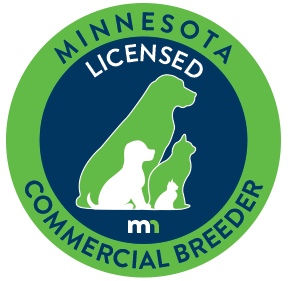Socialization
Before our puppies leave for new homes, they are well socialized with our family, other adults, and children.
They have taken rides in their kennels in our SUV. They are played with and physically loved every day. They have only limited exposure to people from outside our kennel, in order to keep them safe from parvo virus and other diseases or illnesses that could harm them, since they are at risk not having their immunizations yet. Still, we carefully allow certain adults and children to take part in the fun of puppy play!
It is important for the puppies to stay with their mothers and siblings until they are 8 weeks of age, for good “pack socialization” in addition to their bonding with humans. Puppies will grow into well-adjusted dogs if they are allowed to spend this time with their original family!
A properly socialized dog is well adjusted and makes a good companion. It is neither frightened by nor aggressive towards anyone or anything it would normally meet in day-to-day living.
An un-socialized dog is untrustworthy and an unwanted liability. They often become fear-biters. Often they like to fight with other dogs. They are difficult to train and are generally unpleasant to be around. Unsocialized dogs cannot adapt to new situations and a simple routine visit to the vet is a nightmare not only for the dog itself, but for everyone involved. Don’t let this happen to your puppy.
You must start the socialization process immediately.
Make sure that each of the following events are pleasant and non-threatening. If your puppy’s first experience with something is painful and frightening, you will be defeating your purpose. In fact, you will be creating a phobia that will often last a lifetime. It’s better to go too slow and assure your puppy is not frightened or injured than to rush and force your pup to meet new things and people.
- Invite friends over to meet your pup. Include men, women, youngsters, seniors, etc.
- Invite friendly, healthy, vaccinated dogs, and puppies to your home to meet and play with your new puppy. Take your puppy to the homes of these pets, and even introduce them to dog-friendly cats.
- Carry your pup to parks, playgrounds, etc; places where there are crowds of people and plenty of activity.
- Take your puppy for short, frequent rides in the car.
- Introduce your puppy to umbrellas, bags, boxes, the vacuum cleaner, etc. Encourage your puppy to explore and investigate his environment.
- Get your puppy accustomed to seeing different and unfamiliar objects by creating your own. Set a chair upside down. Lay the trash can (empty) on its side.
- Introduce your puppy to new and various sounds. Loud sounds should be introduced from a distance and gradually brought closer.
- Get your puppy used to being brushed, bathed, inspected, having its nails clipped, teeth and ears cleaned and all the routines of grooming and physical examination.
- Introduce your puppy to stairs, and his own leash and collar.
Do not do too much at one time. Young puppies need a lot of sleep and tire quickly. It is much more productive to have frequent and very brief exposures than occasional prolonged exposures. Most importantly do not force or rush your puppy. Let your puppy take things at his own pace.
Hopefully these tips will help you raise a happy, social puppy!



